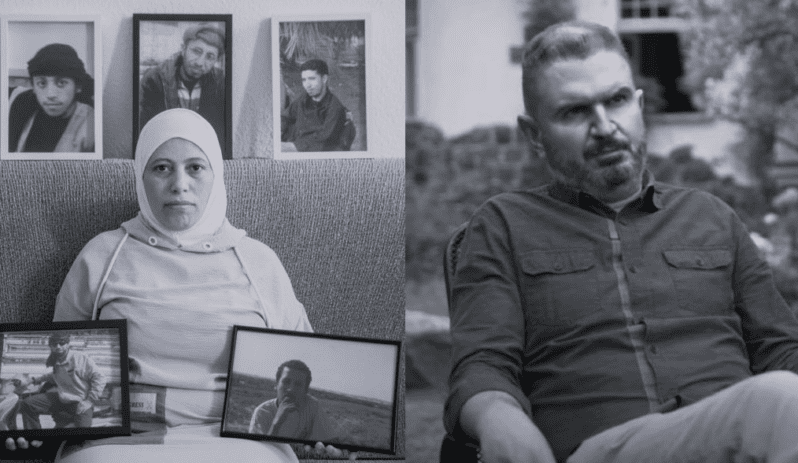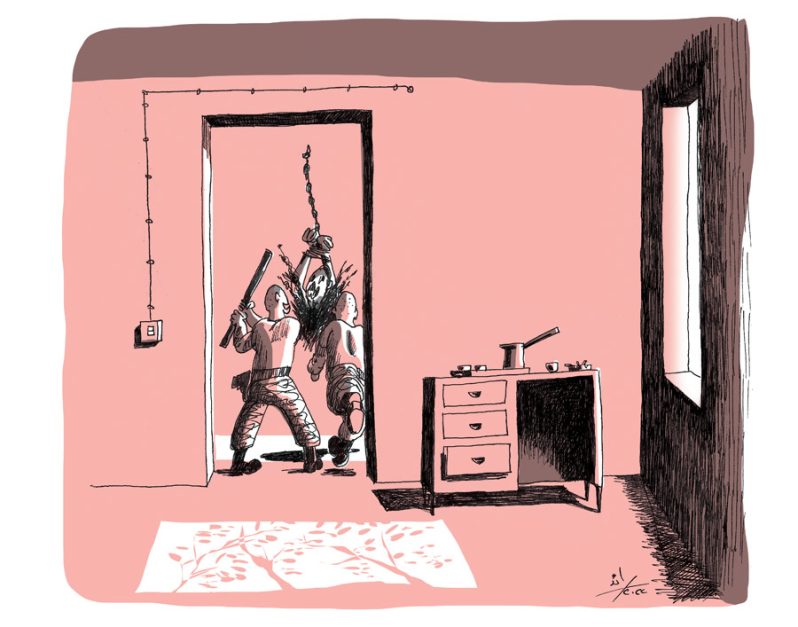The Arab Sharkas Executions in Egypt: Retribution or Revenge?

On May 17, 2015, Egypt awoke to the news that six of the seven people sentenced to death in the ‘Arab Sharkas cell’ case had been executed. They had been tried before the military judiciary on the charge that they led or were members of Ansar Beit al-Maqdis, and were involved in attacks that the organization perpetrated against military targets in March 2014.[1] In October, 2014, the military judiciary sentenced seven of the accused to death, and two others to life imprisonment. When the High Military Court rejected an appeal in March 2015, the ruling became final.
Some people pointed out that the trial lacked due process. Many opposed the trying of the civilians before the military judiciary, seeing it as a contravention of the principle of ‘the natural judge’. Furthermore, the fact that two of the accused were already in prison during the incidents for which they were being tried, contradicted the notion that they participated in them.[2]
The implementation of the ruling and the circumstances surrounding it prompts a number of observations.
It signals a transition from the phase of issuing death sentences to the phase of carrying them out.
The Arab Sharkas ruling is among a series of similar rulings recently issued in Egypt; the death sentences of 529 accused persons were referred to Egypt’s Grand Mufti for confirmation in 2014, and the death sentences of former President Mohammed Morsi and 121 other accused persons were referred to the Grand Mufti in May 2015. The extremely hasty implementation of this particular ruling under dubious circumstances demonstrates that the state has truly left the phase of issuing death sentences, and entered the phase of carrying them out. This phase began in March 2015, when a man sentenced to death for throwing children from a rooftop in Alexandria was executed. Together with the implementation of the Arab Sharkas ruling, this phase was further consolidated.
The sentence was carried out in a hasty, unexpected manner that contravened the law and established practices.
This can be discerned from a number of facts surrounding the case.
Firstly, the ruling was carried out despite being the subject of an appeal before the administrative judiciary. The lawyers of some of those sentenced had appealed the minister of defense’s confirmation of the ruling on the basis that such confirmation must come from the president.[3] The court had postponed examining the case until May 19, 2015. As such, the implementation of the ruling two days before this date thwarted the appeal by depriving it of its subject matter. Notably, the Court of Administrative Judiciary decided in its May 19 sitting to postpone the case to its June 2 sitting for a rehearing.[4] Although appealing the administrative directive confirming a ruling does not in and of itself prevent the ruling from being implemented, death sentences should be delayed when such appeals exist. This allows individuals sentenced to death to exercise their right to appeal and to defend their fundamental right to life. From this standpoint, the military judiciary appears to have hastily carried out the ruling in order to prevent the administrative court from potentially suspending it.
In the same vein, the ruling was carried out even though the accused were being tried in the regular criminal courts on other charges, including attacking civilian facilities. This further raises questions about why the ruling was implemented with such haste, and about the state’s motives in imposing its prestige without regard for fundamental rights, such as the right to a fair trial and the right to life.
Secondly, the fact that the rulings were carried out without informing the relatives of those sentenced –a contravention of the Criminal Procedure Code– increases concerns surrounding the event. Article 472 of this law stipulates that “the relatives of a person sentenced to execution have the right to meet with him or her on the day that the sentence is carried out, although that [meeting] must occur away from the place of execution”. This stipulation was not fulfilled, as the relatives were not informed of the date and location of the executions, and had not been allowed to meet with those sentenced beforehand. They learned of the executions through the media, and were only able to confirm the news through lawyers who attended trial hearings before the administrative judiciary on the day in question.[5] This is not only a contravention of the law, but it is also inhumane, particularly as the families of some of the accused had not been able to visit them for three months. Similarly, the lawyers of those sentenced were not informed of the date that the ruling would be carried out. This contravenes article 474 of the Criminal Procedure Code, which stipulates that the defense lawyer must be allowed to attend the execution.[6]
Thirdly, some lawyers, such as Fatma Serag and Mohamed Adel, have indicated that the executions contravened established practices relating to the implementation of death sentences. Since prisoners sentenced to death must take their place in the death row queue, years usually pass before the executions are carried out. Serag pointed out that the Prisons Department settled on this practice in order to give accused persons the chance for new evidence to emerge, evidence that may lead to a retrial or an annulment of their conviction.[7]
All of the aforementioned facts prove that the decision to implement the sentence was taken in a sudden, arbitrary manner without advance planning. The reason for such rashness is discussed below.
3. Hastily exacting revenge for the killing of three judges?
This observation, as it relates to the previous one, concerns the fact that the executions occurred a single day after members of one of the terrorist-designated organizations affiliated with the so-called ‘ISIS-Sinai Province’ assassinated judges in the city of Arish. The sudden implementation of the death sentences at such a time, without any consideration for legal principles raises a legitimate question about whether it was actually a swift response to the assassination of the Arish judges. The matter resembles Jordan’s implementation of the death sentences in December 2014, eight years after the country suspended the death penalty. Some read these executions as an attempt by the Jordanian state to impose its prestige, instead of exacting retribution.[8]
The prevalence of the state’s vengeful tendency, over its tendency to follow reason and law warns of a dangerous slide towards adopting the modus operandi of terrorist organizations. The state and the terrorist-designated organizations are entering into a stage of direct conflict, with each side seeking the elimination of members of the other party to exact revenge for its group’s own. In other words, the state is becoming more of a tool for exacting revenge, than a tool for enacting justice.
Calls to Suspend the Death Penalty in Egypt so that Terrorism Does Not Triumph Over the State’s Values
In light of the death sentences issued since 2014, most of which pertain to cases of a political nature, many people in Egypt have called for the implementation of the death penalty to be suspended for a number of years. These calls stem from concerns about the current climate, and from a perception that fair trial procedures are not being followed.[9]
On May 19, 2015, the ‘Against Execution’ campaign published a statement on its Facebook page calling for every accused person, without distinction, to be given a fair trial. It stressed that “applauding executions that lack the most basic legal procedures constitutes a victory for terrorism over the community, the state, and the state’s institutions”, and it pointed out that more than 80 crimes are now punishable by death in Egypt. The statement also stressed that employing the death penalty in this manner is not a deterrent to crime, but clears the path in front of real criminals. The campaign called upon the state to suspend the death penalty for at least 5 years.
The responses to these calls may be the strongest confirmation of the concerns of those making these appeals. For example, on May 21, National Council for Human Rights member Hafez Abu Saada, stated that “calls to abolish the death penalty do not suit the political circumstances that Egypt is currently witnessing”.[10] Such discourse only confirms that the current political regime has a new tendency to use the death penalty –not just by wavering and articulating it, but also (and, in particular) by carrying it out– as a bloody weapon against its political opponents. It is being used to set an example.
This article is an edited translation from Arabic.
__________
[1] See: Hossam Bahgat’s, “The Arab Sharkas Cell: the Quasi-Covert Military Trial of Ansar Beit al-Maqdes”, Mada Masr, August 27, 2014 (published in English on September 2, 2014).
[2] Ibid.
[3] See: Mohamed Hamama`s, “Has Justice Jumped the Gun? Two Days Prior to a Legal Appeal for Their Stay of Execution, Why Did the State Rush to Execute the Arab Sharkas Defendants?”, Mada Masr, May 18, 2015 (published in English on May 19, 2014).
[4] The news was published in various Egyptian newspapers on May 19, 2015.
[5] See note 3 above, idem.
[6] Article 474 of the Criminal Procedure Code states the following: “The implementation of the death penalty must be attended by one of the Public Prosecutor’s representatives, the prison’s governor, and the prison’s doctor or another doctor appointed by the Public Prosecution. No other persons may attend the execution unless they receive special permission from the Public Prosecution. However, the defense lawyers of the person sentenced must always be allowed to attend.”
[7] See note 3 above, idem.
[8] See: Hamdi al Kbailat`s, “Execution: Retribution or the State Imposing the Government’s Prestige in Jordan?”, The Legal Agenda, December 26, 2014.
[9] See: “Calls to Abolish the Death Penalty”, al-Mesryoon, May 25, 2014.
[10] The news was published on the website of Shorouk News, May 21, 2015.



